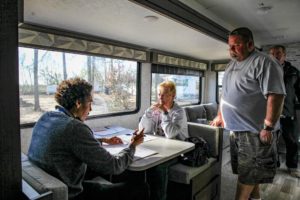Tax credit seen as good investment in economic recovery

A couple prepares to occupy a FEMA travel trailer in Marianna, FL., February 2019. Courtesy Robert Kaufmann/FEMA
When natural disasters strike, the first casualties are people, followed by their homes and possessions. Hurricane Michael damaged or destroyed 68% of Bay County residences when it made landfall there last October. As a result, 25,000 of its 185,000 residents left the area. Now there’s a measure in Congress designed to help homeowners impacted by a natural disaster return to a home – in their hometown.
U.S. Rep. Neal Dunn (R-Florida) represents the second congressional district made up largely of the Panhandle counties impacted by Michael’s devastation. Last month, he introduced his “Residential Recovery Zone Act” in the U.S. House of Representatives. The bill is designed to incentivize both residential development and home ownership in affected disaster areas. It allows homeowners in disaster areas to receive a tax credit up to 10% of the purchase price of a new home costing up to $1.5 million. The credit is limited to $8,000 per year.
The proposal has something for banks and investors, too. It allows banks to earn Community Reinvestment Act (CRA) credit for loaning to individuals who are purchasing a home in a residential recovery zone. It also allows a state to designate certain federally-declared disaster areas to be deemed “opportunity zones.” Opportunity zones, which were a product of the Tax Cuts and Jobs Act, provide direct tax incentives to investors to help revitalize an economically distressed area in exchange for deferred capital gains taxes.
Housing remains one of the biggest problems in Bay County, with more than half of the roughly 8,400 existing apartments still damaged and unlivable, too.
“While we are working hard to rebuild, many Hurricane Michael victims are facing a housing crisis. These people are having to make tough decisions and some have even moved away because of lack of affordable housing,” said Congressman Dunn in a release. “While not a complete solution, this bill will help home buyers and spur investors in disaster areas. By incentivizing home-buying we can stimulate the local economy and make it clear to all that the Panhandle is open for business.”
The bill has been sent to the U.S. House Ways and Means and the Financial Services Committees. So far, there is no companion bill in the U.S. Senate.
LMA Newsletter of 8-12-19

